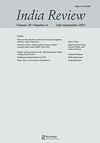Winning big: The political logic of winning elections with large margins in India
IF 0.6
3区 社会学
Q3 AREA STUDIES
引用次数: 1
Abstract
ABSTRACT Politicians winning elections with large margins of victory, beyond what is necessary to win electoral contests,what we term “winning big”, is a common, yet under-studied phenomenon across the world. Political economy models suggest that winning big is not an optimal allocation of scarce campaign resources in a SMP/FPTP electoral system. Inductive inquiry shows that incumbent politicians likely to win nevertheless campaign hard, often devoting considerable effort and resources, for reasons that remain unexamined. Focusing on India, this article explores a range of reasons that can help explain this phenomenon through an innovative research design that combines quantitative analysis with in-depth elite interviews with incumbent MPs from 10 states. We distinguish the phenomenon of “winning big” from that of “safe” seats,identify and probe factors that can contribute to large margins, including candidate strategy, party popularity, mobilizers, electoral uncertainty, and party control . Our findings suggest that while political parties in India, as elsewhere, do not spend more money on electoral contests that they likely to win comfortably, winning big can be the result, among other factors, of a party strategy to establish a reputation for invincibility, and/or individual efforts, stemming from a sense of political vulnerability felt by politicians, underestimated in the literature on safe seats.大获全胜:印度以巨大优势赢得选举的政治逻辑
政治家以巨大的优势赢得选举,超出了赢得选举竞争的必要条件,我们称之为“大获全胜”,这是一个普遍的现象,但在世界范围内尚未得到充分研究。政治经济学模型表明,在SMP/FPTP选举制度中,大获全胜并不是对稀缺竞选资源的最佳分配。归纳调查显示,在任的政客们可能会赢得选举,但他们会努力竞选,往往会投入大量的精力和资源,原因尚不清楚。本文以印度为重点,通过创新的研究设计,将定量分析与对来自10个邦的现任国会议员的深度精英访谈相结合,探讨了一系列有助于解释这一现象的原因。我们区分了“大胜”和“安全”席位的现象,确定并探讨了可能导致较大差额的因素,包括候选人策略、政党知名度、动员者、选举不确定性和政党控制。我们的研究结果表明,虽然印度的政党和其他地方一样,不会在他们可能轻松获胜的选举竞赛上花费更多的钱,但大胜可能是政党建立无敌声誉的策略和/或个人努力的结果,这些因素源于政治家感受到的政治脆弱性,在安全席位的文献中被低估了。
本文章由计算机程序翻译,如有差异,请以英文原文为准。
求助全文
约1分钟内获得全文
求助全文

 求助内容:
求助内容: 应助结果提醒方式:
应助结果提醒方式:


